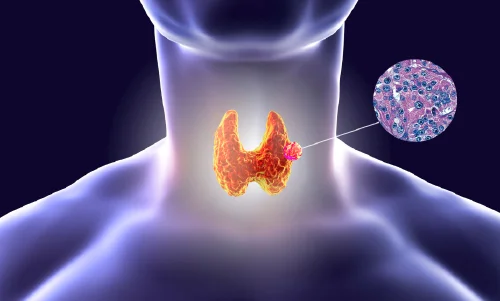Thyroidectomy, a surgical procedure to remove all or part of the thyroid gland, addresses complications such as thyroid cancer, goiter, hyperthyroidism, and suspicious thyroid nodules, ensuring effective management and relief.
If you're considering a thyroidectomy, reach out to us, or book a direct appointment with our ENT specialist. At the CK Birla Hospital, we are dedicated to ensuring that your thyroidectomy is as safe, comfortable, and effective as possible. We're here to guide you every step of the way toward a successful recovery.

If a thyroidectomy is not performed timely when indicated, several risks arise, such as:
Timely surgery is crucial to mitigate these risks.
Thyroidectomies fall into two primary categories: total and partial.
Types of partial thyroidectomies:
Surgically removing all or most of your thyroid tissue is known as a total or near-total thyroidectomy.
Your need for a thyroidectomy will determine the kind of procedure you require. For example:
Your surgeon and you will decide on the best course of action for your operation
The cost of a thyroidectomy varies as per the specific type of treatment advised by a healthcare provider, such as:
The cost can also vary widely depending on several factors, including the location, the extent of the procedure, the surgeon’s experience, and the hospital’s pricing structure.
To get an explicit estimate for the cost of a thyroidectomy at the CK Birla Hospital, contact the hospital directly. Additionally, you can consult with our board-certified ENT specialist to discuss your specific needs and receive a personalised quote for the procedure.
The advantages of laparoscopic/robotic thyroidectomy surgery over traditional thyroidectomy surgery are summarised below:
However, the choice between laparoscopic/robotic and open surgery depends on individual patient factors and surgeon expertise. Each method has its own set of advantages and should be considered in the context of the patient’s overall health and specific circumstances.
| Feature | Laparoscopic/Robotic Surgery | Open Surgery |
| Incision size | Small, keyhole incisions | Larger, single incision |
| Recovery time | Generally shorter | Longer |
| Postoperative pain | Typically less | Typically more |
| Hospital stay | Shorter (often same-day discharge) | Longer |
| Cosmetic result | Minimal scarring | More noticeable scar |
| Return to normal activities | Quicker | Slower |
A thyroidectomy is a surgical procedure to remove all or part of the thyroid gland, which is located in the neck and produces hormones that regulate metabolism.
This surgery is typically performed to treat thyroid cancer, a non-cancerous enlargement of the thyroid (goiter), hyperthyroidism (overactive thyroid), or suspicious thyroid nodules.
To reach the thyroid gland, the surgeon makes an incision at the front of the neck. Advanced techniques like minimally invasive surgery or robotic-assisted surgery may also be used in some cases.
With proper medication and follow-up care, most people can lead a normal, healthy life. Regular blood tests will be needed to monitor thyroid hormone levels.
In many cases, the remaining part of the thyroid can produce enough hormones, but some patients may still require hormone replacement therapy.
After a thyroidectomy, you can generally eat and drink normally, but soft foods and plenty of fluids are recommended initially. Follow your surgeon’s specific postoperative dietary guidelines.